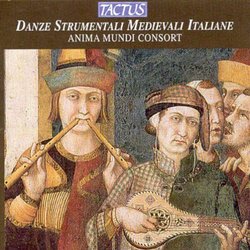| All Artists: Italian Anonymous, Codex Faenza Anonymous, Anima Mundi Consort Title: Danze Strumentali Medieval Italiane Members Wishing: 0 Total Copies: 0 Label: Tactus Records Release Date: 3/8/2005 Genres: Dance & Electronic, Special Interest, Pop, Classical Styles: Vocal Pop, Opera & Classical Vocal, Chamber Music, Historical Periods, Early Music Number of Discs: 1 SwapaCD Credits: 1 UPC: 8007194102857 |
Search - Italian Anonymous, Codex Faenza Anonymous, Anima Mundi Consort :: Danze Strumentali Medieval Italiane
 | Italian Anonymous, Codex Faenza Anonymous, Anima Mundi Consort Danze Strumentali Medieval Italiane Genres: Dance & Electronic, Special Interest, Pop, Classical
|
Larger Image |
CD Details |
CD ReviewsSpirited performances of some interesting works Russ | Richmond, VA | 11/12/2006 (5 out of 5 stars) "The Anima Mundi Consort has undertaken the project of recording all surviving medieval dances to have originated within Italy. The completion of this endeavor is not as epic as it sounds, as only about fifty medieval pieces have survived to the present day. The present release represents the first volume of this project and contains 11 such dance pieces. If you happen to be unfamiliar with 14th and 15th century dance music, it is important to note that these dances are quite different from the dances of the renaissance period. The structure of medieval music is far more irregular and the music tends to leap about unexpectedly. I would say the music is primarily homophonic; meaning that there is a single melodic line, either played by a single instrument or in unison by an ensemble of instruments, with harmonic support provided through a droning low note, which may or may not change in pitch during the dance. Given this simple structure, it is easy to assume that such pieces would be quite boring. Actually, nothing could be further from the truth, as the melodic line is highly virtuosic, and each dance is accompanied by a whole compliment of fascinating percussion instruments. These dances are seldom divided into uniform phrases, with much of the complex melodic ideas evolving seemingly ad infinitum. Stylistically, European medieval music was heavily influenced by the music of the Near East, and this influence is readily apparent in the selections presented on this recording, especially in the florid melodic lines and mesmerizing rhythmic intricacy provided by tabors, darboukas and other percussion instruments. One interesting aspect of this repertoire is that no one performance of these works will sound like another, due to different approaches to ornamentation, variations in the ensemble composition and different interpretations concerning tempo. This particular recording is notable for its ensemble variety. The phrase "everything except for the kitchen sink" seems to apply here. Of course there are representatives from the recorder and viele families, but there are also a wide variety of drums (including some type of medieval cymbal), an early version of the clarinet, early brass instruments, a portative organ and a Jew's harp, just to name a few! Truth be told, I am not certain what some of these instruments are, as the program notes only list the names in Italian and no additional detail is provided. I love this repertoire and this performance by the Anima Mundi Consort is among the most energetic I have heard (they really let things fly in the livelier dances). This release probably ranks as my second or third favorite recording of medieval dance pieces; my favorite (by far) being Opus 111's terrifically recorded "Istanpitta" release, which lacks some of the ensemble variety here, but the musical material is a bit more uniform in quality. Despite the appeal of this music for me, I think this type of music would only appeal to a subset of Early Music fans. So if you find yourself annoyed by the piercing tone of early wind instruments, consider yourself warned. Highly recommended to adventurous Early Music enthusiasts. TT: 54:41 As a side note, the cover of this release illustrates how one player would play two separate recorders. I do not think this technique is used on the present release; although this technique is brilliantly used in the Opus 111 mentioned above (just as extra incentive to pick up that fantastic recording)." Excellent music, not the best recording. John Willoughby | Amherst, MA | 05/05/2007 (3 out of 5 stars) "Sorry, but here comes my spoiler review, the sort that nobody wants to hear.
There are some exciting and quite astonishingly good pieces on this disc, and the playing and especially the percussion are very good. However the dynamics are so all over the place that I can't bear to listen to the whole thing without being within arms length of the CD player so that I can crank the volume up or down as required. I keep meaning to burn this and then use the itunes equalizer to make it istenable without interference, but hey, that was the engineers job. I apologise for dwelling on the recording, but both the music and the musicians deserve better, and I hope that they get it next time." |

 Track Listings (11) - Disc #1
Track Listings (11) - Disc #1